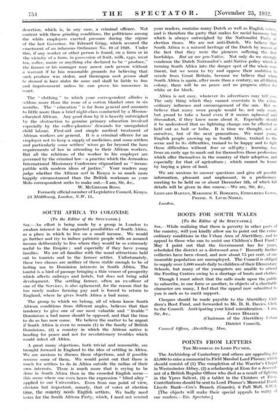SOUTH AFRICA TO COLONISE
[To the Editor of the SPECTATOR.] Sin,—An effort. is being made by a group in London to awaken interest in the neglected possibilities of South Africa, as a place in which to live on a small income. We would go further and try to induce patriotic people with an assured income deliberately to live where they would be so extremely useful to the Empire ; and especially if they have young families. We are all familiar with the usual attractions held out to tourists and to the farmer settler. Unfortunately, these two classes are neither of them stable enough to be of lasting use to Dominion interests in South Africa. The tourist is a bird of passage bringing a thin veneer of prosperity which affects railways and hotels, but does not bring solid development. The settling farmer, often an ex-officer of one of the Services, is also ephemeral, for the reason that he too rarely makes farming pay and is forced to return to England, where he gives South Africa a bad name.
The group to which we belong, all of whom know South African conditions from different angles, believes that that tendency to give one of our most valuable and " livable " Dominions a bad name should be opposed, and that the time to do so has now come. We believe the matter to be urgent if South Africa is even to remain (1) in the family of British Dominions, (2) a country in which the African native is heading for peace and not for revolutionary troubles which would infect all Africa.
A great many objections, both trivial and reasonable, are brought forward in England to the idea of settling in Africa. We are anxious to discus those objections, and if possible remove some of them. We would point out that there is much for settlers to do in Africa outside the radius of their own interests. There is Much more that is crying to be done in South. Africa than in the crowded English scene— this scene where one even hears the expression "blind alley" applied to our Universities. Even from one point of view, obvious but important, namely, that of votes at election time, the country needs English settlers. We badly need votes for the South African Party, which, I need not remind your readers, contains many Dutch as well as English voters, and is therefore the party that makes for racial harmony but which is always outweighed by the Nationalist Party at election times. We are not anti-Dutch. We believe that South Africa is a natural heritage of the Dutch by reason of the fact that they were the pioneers suffering the first hardships. But we are pro-Native. Not only do we strongly condemn the Dutch Nationalist's anti-Native policy which is turning South Africa into the danger spot of the whole con- tinent, but we mean to try and oppose their ambition to secede from Great Britain, because we believe that when South Africa is again, after more than a century, an all-Dnich colony, there will be no peace and no progress either 11,1: white or for black.
'Africa is not easy, 'whatever its advertisers may tell you. The only thing which they cannot Overstate is the extra- ordinary influence and encouragement of the sun. But we believe that many More people would, be, not only ready but proud to take a hand even if it means upheaval and diSconifort, if they knew more about it. Especially should it be understood that no lightning change can be effected or held out as bait or bribe.. It is time we thought, not at ourselves, but of the next generations. We .want young English people growing up in South Africa, trained to the scene and to its difficulties, trained to be happy and to light those difficulties without fear or self-pity ; learning, too; from an early age to mark out for themselves those professions which offer themselves in the country of their- adoption, and especially -for that of agriculture ;. which cannot be learnt by buying a piece of land.
We are anxious to answer questions and give all possible information, pleasant and unpleasant, in a preliminary meeting to be held on or about December 5th, of which full details will be given in due course.—We are, Sir, &c., LEONARD BARNES, MARJORIE E. ROBERTS, ETHELREDA LEWIS, FREDK. S. LIVIE-NOBLE.
London.






































 Previous page
Previous page